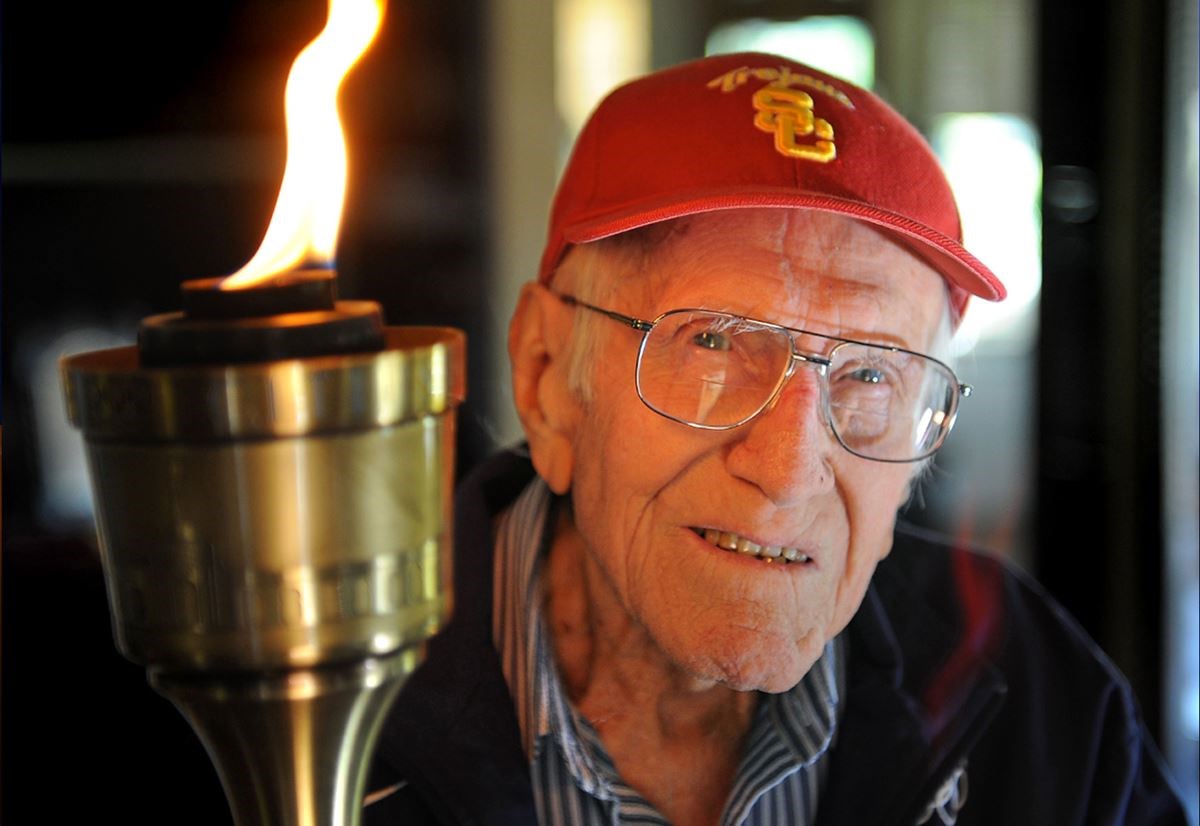 Zamperini in photo released by Pasadena Tournament of Roseshttps://www.gospelherald.com/articles/51811/20140703/christian-olympian-war-hero-louis-zamperini-dies-97-angelina-jolie-unbroken-release-christmas-day.htmMartin Luther King Jr. once said, “The ultimate measure of a man is not where he stands in moments of comfort and convenience, but where he stands at times of challenge and controversy” (King). Heroism is shown best when one is put under pressure and out of his comfort zone. It is something that results from struggle and difficulty, not glory and ease. A worthy hero is a lot more common than one might think. Heroes will be most easily found where challenges lie. People’s heroism lies in their actions under pressure, and what they do with their time in this world. True heroism could be something as simple as someone finding it in themselves to forgive somebody in order to move forward. A hero is somebody who has the confidence they can fix something, and not only that but the desire to do so. The true determiner of one’s heroism lies in how determined that person is to solve a problem. Determination and will to succeed are the inevitable factors that play into heroism; what good is a hero if they do not want to be one? A hero worthy of respect needs to have the desire to do good and be good. A hero must needs to let go of hatred in their life; and if they do not, their other strengths can be deemed useless.
Zamperini in photo released by Pasadena Tournament of Roseshttps://www.gospelherald.com/articles/51811/20140703/christian-olympian-war-hero-louis-zamperini-dies-97-angelina-jolie-unbroken-release-christmas-day.htmMartin Luther King Jr. once said, “The ultimate measure of a man is not where he stands in moments of comfort and convenience, but where he stands at times of challenge and controversy” (King). Heroism is shown best when one is put under pressure and out of his comfort zone. It is something that results from struggle and difficulty, not glory and ease. A worthy hero is a lot more common than one might think. Heroes will be most easily found where challenges lie. People’s heroism lies in their actions under pressure, and what they do with their time in this world. True heroism could be something as simple as someone finding it in themselves to forgive somebody in order to move forward. A hero is somebody who has the confidence they can fix something, and not only that but the desire to do so. The true determiner of one’s heroism lies in how determined that person is to solve a problem. Determination and will to succeed are the inevitable factors that play into heroism; what good is a hero if they do not want to be one? A hero worthy of respect needs to have the desire to do good and be good. A hero must needs to let go of hatred in their life; and if they do not, their other strengths can be deemed useless.
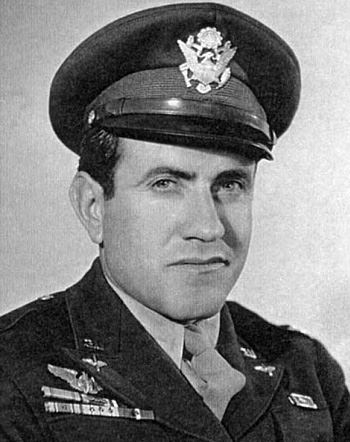 Portrait of Zamperini for the Air Forcehttps://eagleeyededitor.wordpress.com/2018/02/18/louis-zamperini-story-determination/Floating lost at sea for forty-seven days, then managing to live only to become a prisoner of war for two years instantly bring the word hero to mind. The fact that Louie Zamperini was a war hero is not what makes him a true hero in life. He exemplifies two of the most important traits: desire to succeed and inspire others, and living without hatred and accepting love instead. Louie Zamperini was born in Olean, New York on January 26, 1917. Zamperini developed a passion for running in his teenage years, and competed in long distance and ran in the 1936 Olympic games. But Zamperini was drafted and had his career put on hold when WWII broke out. During the war, Zamperini’s plane crashed; he was lost at sea for forty-seven days. He was then picked up by the Japanese and became a prisoner of war. After the war, he suffered from PTSD and had major anger issues. Despite these issues, he still proved himself to be a hero. A hero must possess determination and forgiveness. Zamperini exemplifies his determination when he trains for the Olympic games. In both situations, he shows his will to triumph and proves he can succeed. After Zamperini exemplifies his determination to make it home after 2 years of torture, he experiences PTSD. He finds the only way to forget the terrible things he was subject to was to forgive those who put him through it and free himself of hatred. Louie Zamperini is an exemplary hero because of his indomitable will to overcome adversity and his determination to succeed, all while letting go of feelings of revenge and forgiving those who have wronged him.
Portrait of Zamperini for the Air Forcehttps://eagleeyededitor.wordpress.com/2018/02/18/louis-zamperini-story-determination/Floating lost at sea for forty-seven days, then managing to live only to become a prisoner of war for two years instantly bring the word hero to mind. The fact that Louie Zamperini was a war hero is not what makes him a true hero in life. He exemplifies two of the most important traits: desire to succeed and inspire others, and living without hatred and accepting love instead. Louie Zamperini was born in Olean, New York on January 26, 1917. Zamperini developed a passion for running in his teenage years, and competed in long distance and ran in the 1936 Olympic games. But Zamperini was drafted and had his career put on hold when WWII broke out. During the war, Zamperini’s plane crashed; he was lost at sea for forty-seven days. He was then picked up by the Japanese and became a prisoner of war. After the war, he suffered from PTSD and had major anger issues. Despite these issues, he still proved himself to be a hero. A hero must possess determination and forgiveness. Zamperini exemplifies his determination when he trains for the Olympic games. In both situations, he shows his will to triumph and proves he can succeed. After Zamperini exemplifies his determination to make it home after 2 years of torture, he experiences PTSD. He finds the only way to forget the terrible things he was subject to was to forgive those who put him through it and free himself of hatred. Louie Zamperini is an exemplary hero because of his indomitable will to overcome adversity and his determination to succeed, all while letting go of feelings of revenge and forgiving those who have wronged him.
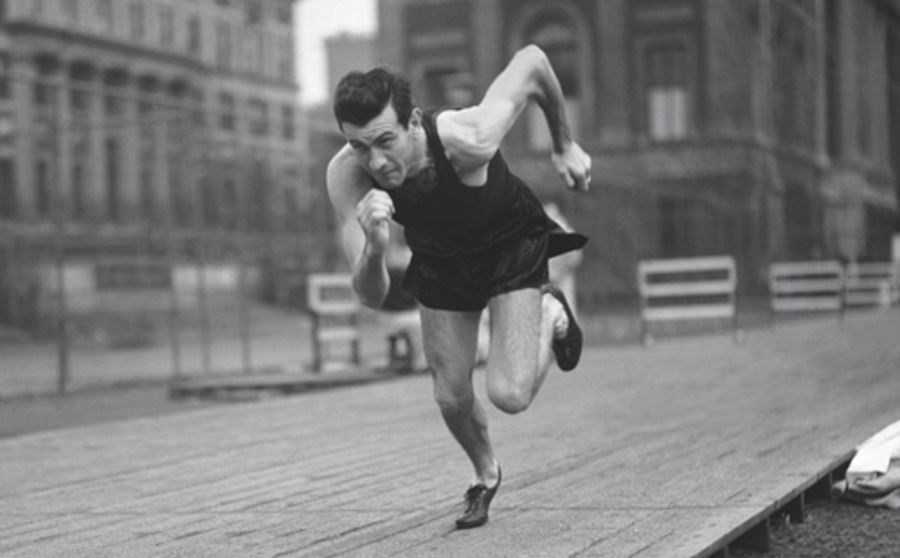 Louis Zamperini training: he broke many records in his teen years.https://whatstrending.com/news/12244-wwii-hero-louis-zamperini-passes-away-at-97/Louie Zamperini’s determination to successfully accomplish his goals shows that anything is possible with the right mindset and dedication. Zamperini’s determination to succeed is clearly exhibited with his athleticism. His ultimate goal was to make it to the Olympic games, but he knew he was not fast enough yet to participate in his main event: the mile. But he was still determined to make it to the Olympics, no matter what. Because of that, he took to a new event to carry him to the Olympic games: the 5,000 meters: “He had only two weeks to train for Compton and, with the Olympic trials in July, two months to become America’s youngest elite 5,000-meter man. But he had nothing to lose. He trained so hard that he rubbed the skin right off one of his toes, leaving his sock bloody” (Hillenbrand, 23). This quote is important because it shows how Zamperini was able to go out of his way and train for something that he had no experience in. He was determined to get to the olympic games, which is exhibited with training so hard his sock became bloody. Most people would not train hard enough and want something so bad that their foot bled, but Zamperini was not most people. This level of determination is what carried Zamperini through his life and allows him to succeed. During WWII, Zamperini found himself in a difficult situation after his plane crashed into the ocean, leaving him on a raft lost at sea. He faced the biggest challenge he had come across so far in his life, and Hillenbrand brings to light what makes Zamperini so special: “Louie’s success in carrying them off had given him the conviction that he could think his way around any boundary. The same attributes that made him the boy terror of Torrance were keeping him alive in the greatest struggle of his life” (Hillenbrand, 155). Zamperini was a difficult boy when he was young, hence the name “boy terror of Torrance”. He was always coming up with schemes and tricks. As Hillenbrand says, he always had the idea he could “think his way around any boundary”, which is an important characteristic in a hero. Instead of breaking down like other people would, he got to thinking. He had not only the confidence he could make it through his struggles, but the determination to do so as well. Because Zamperini always had the willpower he needed inside him, he was able to fix his mind on exactly what he needed to do. His determination defined his character and this attribute is what kept him alive. If not for his incredible determination and confidence he could overcome his struggles, Zamperini would not have developed into the hero he became.
Louis Zamperini training: he broke many records in his teen years.https://whatstrending.com/news/12244-wwii-hero-louis-zamperini-passes-away-at-97/Louie Zamperini’s determination to successfully accomplish his goals shows that anything is possible with the right mindset and dedication. Zamperini’s determination to succeed is clearly exhibited with his athleticism. His ultimate goal was to make it to the Olympic games, but he knew he was not fast enough yet to participate in his main event: the mile. But he was still determined to make it to the Olympics, no matter what. Because of that, he took to a new event to carry him to the Olympic games: the 5,000 meters: “He had only two weeks to train for Compton and, with the Olympic trials in July, two months to become America’s youngest elite 5,000-meter man. But he had nothing to lose. He trained so hard that he rubbed the skin right off one of his toes, leaving his sock bloody” (Hillenbrand, 23). This quote is important because it shows how Zamperini was able to go out of his way and train for something that he had no experience in. He was determined to get to the olympic games, which is exhibited with training so hard his sock became bloody. Most people would not train hard enough and want something so bad that their foot bled, but Zamperini was not most people. This level of determination is what carried Zamperini through his life and allows him to succeed. During WWII, Zamperini found himself in a difficult situation after his plane crashed into the ocean, leaving him on a raft lost at sea. He faced the biggest challenge he had come across so far in his life, and Hillenbrand brings to light what makes Zamperini so special: “Louie’s success in carrying them off had given him the conviction that he could think his way around any boundary. The same attributes that made him the boy terror of Torrance were keeping him alive in the greatest struggle of his life” (Hillenbrand, 155). Zamperini was a difficult boy when he was young, hence the name “boy terror of Torrance”. He was always coming up with schemes and tricks. As Hillenbrand says, he always had the idea he could “think his way around any boundary”, which is an important characteristic in a hero. Instead of breaking down like other people would, he got to thinking. He had not only the confidence he could make it through his struggles, but the determination to do so as well. Because Zamperini always had the willpower he needed inside him, he was able to fix his mind on exactly what he needed to do. His determination defined his character and this attribute is what kept him alive. If not for his incredible determination and confidence he could overcome his struggles, Zamperini would not have developed into the hero he became.
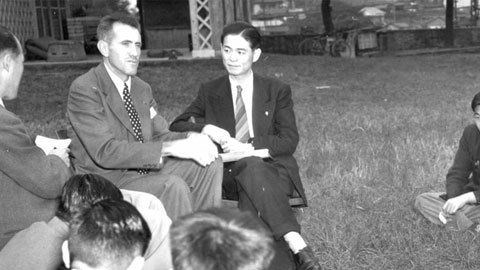 Louis Zamperini forgave his captors for peace in his life.https://www.wingclips.com/movie-clips/unbroken/forgiveness-is-always-possible
Louis Zamperini forgave his captors for peace in his life.https://www.wingclips.com/movie-clips/unbroken/forgiveness-is-always-possible
Louie Zamperini’s ability to forgive anybody teaches the world that people will live a better and more open life if they let go of hatred and open their heart. Louie Zamperini had a lot of post-war trauma due to when he was a POW (prisoner of war) in Japan. The control he had over his life was falling out of his hands because of his PTSD, and he was looking for anything to help him: “Zamperini later claimed he was saved from his posttraumatic stress after witnessing a sermon by the evangelical preacher Billy Graham in 1949… In 1950, Zamperini returned to Japan for the first time since his liberation to address the Japanese war criminals held at Sugamo Prison in Tokyo. While there, he shook hands and embraced many of his old camp guards. Mutsuhiro Watanabe had avoided capture, but Zamperini later wrote a letter forgiving his former tormenter and even unsuccessfully tried to meet with him while in Japan” (Andrews). In any one person’s life, being forgiving is an important attribute. But Zamperini found that he was able to turn his life around and solve his problems by letting go of the past and focusing on the now with forgiveness. It is impressive how he found the strength in himself to forgive people somebody “had Zamperini hold a heavy wooden beam above his head and threatened to shoot him if he dropped it” (Andrews). Some people cannot even find it within themselves to forgive small blunders, let alone forgive those who have tortured them. Zamperini was different, and accepted everyone to made it his mission to resolve the pain he had. In his memoir, he reflects on his experiences and what he has learned. He reveals what compelled him to forgive others: ”All I knew was that hate was so deadly as any poison and did no one any good. You had to control and eliminate it, if you could” (Zamperini). This mind set is what made Zamperini heroic. He had the ability to see that hate is malicious, which led him to be so forgiving. Heroism is defined as “great bravery”, and it does indeed take great bravery to let go of hate, especially after enduring what he had. If he had not done this, he would have likely never turned his life around for the better. By promoting this goodness and purity, he proved himself to be a good role model and true hero. Louie Zamperini was an inspiration figure because of his ability to forgive those that wronged him despite all the trouble, pain, and hardship they sent his way.
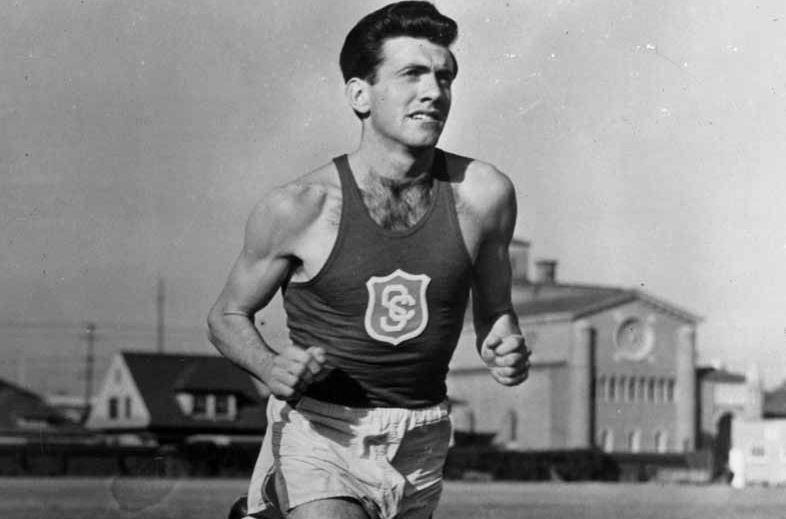 Zamperini doing what he loved: running.https://www.gospelherald.com/articles/53578/20141213/unbroken-louis-zamperini-s-daughter-talks-about-his-extraordinary-life-and-walk-with-god.htmLouie Zamperini not only proved his heroism by showing his great willpower to overcome any obstacle and proving that anybody can overcome their challenges, but he was also a man with great goodness inside him and the ability to forgive anybody. Zamperini proved that anybody can accomplish what they set their mind to do, but only if they have the persistence to do so. His determination to succeed was shown when he started training for an event a mere two weeks before the olympic trials and he still qualified. He gave hope to others who hoped to achieve as much as he did. On a whole other level of difficulty, Zamperini also managed to survive two years as a POW and still make it home. Though he did survive, he did struggle with PTSD and nightmares. As a POW, he was severely tortured, and he realized that in order to live a happy life once more, he needed to forgive his captors. Once he did this, all his struggles were gone and he taught others that hate is not the answer. I deem Zamperini a hero because of the strength he had. He always wanted to overcome his challenges and flourish. As a child, Zamperini had a lot of issues and challenges. When he joined track, it gave him a completely new outlet and he changed. I saw how much this changed him and how it made him so much happier, so I decided to give track a try. Now when I race at a meet, I think about how Zamperini would be giving it everything he had, and I push myself as hard as I can. Seeing his accomplishments and persistence always push me to try my hardest. As Zamperini said, “You will always discover so much of value along the way [of life] because you’ll always run into problems”. When I look at what Zamperini did in his life, I see that he was not a man who intended to be a hero, but he was a hero because when he “stood in times of challenge and controversy”, he pushed himself to conquer these challenges. Not everybody wants to be a hero, but sometimes they just naturally are.
Zamperini doing what he loved: running.https://www.gospelherald.com/articles/53578/20141213/unbroken-louis-zamperini-s-daughter-talks-about-his-extraordinary-life-and-walk-with-god.htmLouie Zamperini not only proved his heroism by showing his great willpower to overcome any obstacle and proving that anybody can overcome their challenges, but he was also a man with great goodness inside him and the ability to forgive anybody. Zamperini proved that anybody can accomplish what they set their mind to do, but only if they have the persistence to do so. His determination to succeed was shown when he started training for an event a mere two weeks before the olympic trials and he still qualified. He gave hope to others who hoped to achieve as much as he did. On a whole other level of difficulty, Zamperini also managed to survive two years as a POW and still make it home. Though he did survive, he did struggle with PTSD and nightmares. As a POW, he was severely tortured, and he realized that in order to live a happy life once more, he needed to forgive his captors. Once he did this, all his struggles were gone and he taught others that hate is not the answer. I deem Zamperini a hero because of the strength he had. He always wanted to overcome his challenges and flourish. As a child, Zamperini had a lot of issues and challenges. When he joined track, it gave him a completely new outlet and he changed. I saw how much this changed him and how it made him so much happier, so I decided to give track a try. Now when I race at a meet, I think about how Zamperini would be giving it everything he had, and I push myself as hard as I can. Seeing his accomplishments and persistence always push me to try my hardest. As Zamperini said, “You will always discover so much of value along the way [of life] because you’ll always run into problems”. When I look at what Zamperini did in his life, I see that he was not a man who intended to be a hero, but he was a hero because when he “stood in times of challenge and controversy”, he pushed himself to conquer these challenges. Not everybody wants to be a hero, but sometimes they just naturally are.
Works Cited
Andrews, Evan. “8 Things You May Not Know About Louis Zamperini.” History.com, History,
17 Dec.2014,www.history.com/news/8-things-you-may-not-know-about-louis-zamperini.
Hillenbrand, Laura. Unbroken: a World War II Story of Survival, Resilience, and Redemption.
Random House Trade Paperbacks, 2014.
Zamperini, Louis, and David Rensin. Devil at My Heels: a Heroic Olympians Astonishing Story
of Survival as a Japanese POW in World War II. Perennial, 2004.
Page created on 5/29/2018 1:54:27 AM
Last edited 5/29/2018 2:55:21 AM
